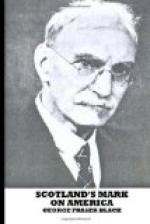Always devoted to literary studies, as a historical
and genealogical writer he has earned an enviable
reputation. James Morrison Steele Mackaye (1842-94),
actor and dramatist, was grandson of William Kay who
came from Scotland about 1800. His son, Percy
Wallace Mackaye (b. 1875) is a distinguished dramatist
and poet. Wallace Bruce (b. 1844), poet and essayist,
was descended from George Bruce who came from Scotland
in 1635. While United States Consul at Edinburgh
(1889-93) he secured the erection of a statue of Lincoln
in the Calton Burial Ground, to commemorate the services
of Scottish-American soldiers in the Civil War.
James Kennedy, born at Aberlemno, Forfarshire, in 1850,
is a well-known poet, author, and lecturer. John
D. Ross, born in Edinburgh in 1853, is author of several
literary works particularly relating to Scotland.
Francis Marion Crawford (1854-1909), the novelist,
son of Thomas Crawford the sculptor, was also of Scottish
descent. Henry Morse Stephens, the historian,
was born in Edinburgh in 1857. Ernest Evan Seton-Thompson
(b. 1860), artist, author, and naturalist, and Charles
William Wallace (b. 1865), philologist and Shakespearean
scholar, are both of Scottish descent. John Hanson
Thomas McPherson (b. 1865), historian and educator,
author of “History of Liberia” (1891),
is a descendant of Robert McPherson who came from Scotland
in 1738. George Barr McCutcheon (b. 1866), author
of many widely read works of fiction ("Graustark,”
“Brewster’s Millions,”
etc.)
is a descendant of John McCutcheon who emigrated from
Scotland in 1730. Mary Johnston (b. 1870), author
of “Prisoners of Hope” (1898), “To
have and to hold” (1899),
etc., is a descendant
of Peter Johnston who emigrated to Virginia in 1727.
SCOTS IN THE CHURCH AND SOCIAL WELFARE
Francis Makemie (c. 1658-1708), the organizer of the
first American Presbytery, was born in Ulster of Scots
parentage. In 1676 he went to Glasgow to attend
the classes in the University there, and his name
still stands in the matriculation register of the University:
“Franciscus Makemius ... Scoto-Hibernus,”
i.e. Francis Makemie, a Scot of Ireland.
In 1683 he was ordained by the Presbytery of Laggan
and sent over to the American colonies, where he immediately
began the organization of churches and presbyteries.
William Traill, another Scot, Moderator of the Presbytery
of Laggan, was sent over shortly before Makemie but
he confined his work to preaching. George Gillespie
(1683-1760), born in Glasgow, was one of the earliest
ordained ministers in New Jersey and Delaware.
Alexander Garden (1685-1756), an Episcopalian, born
in Edinburgh, settled in Charleston, South Carolina,
as Rector of St. Philip’s Episcopal Church.
Samuel Auchmuty (1722-77), son of the eminent Scottish
lawyer of Boston, was Rector of Trinity Church, New
York city, and had charge of all the churches there.
Thomas Gordon, the “fighting parson” of




